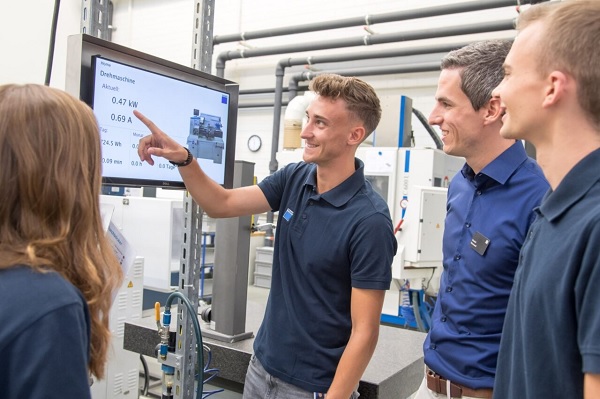
An important technology is moving from the research lab into daily use. Not fast enough, perhaps, in the view of those hoping to gain a significant competitive edge from AI. Rather sinisterly in the view of others who currently only have a vague idea of how self-thinking machines could change their everyday working lives. In the "Future of Business" focus topic at EMO Hannover 2023, the world's leading trade show for production technology, experts will be answering urgent questions about new business and working methods. Meanwhile, German universities are supporting AI by convincing local companies to implement AI applications, and by preparing employees to perform new tasks.
ProKI (ProAI), is playing a crucial role here. This is the name of an initiative launched by the WGP(German Academic Association for Production Technology) at the end of last year. Backed by 17 million euros of funding provided by the BMBF (Federal Ministry of Education and Research), a nationwide demonstration and transfer network is being set up at a total of eight locations to provide practical support for the implementation of AI solutions in industry. The initiative is coordinated by the WZL(Laboratory for Machine Tools and Production Engineering) at RWTH Aachen University. Taking part are institutes in Berlin, Darmstadt, Dresden, Hannover, Ilmenau, Karlsruhe and Nuremberg. In line with their respective research focuses, they are providing demonstrators and test environments for manufacturing companies in the fields of joining, forming, machining and coating.
Wide range of services provided free of charge to companies
"Each individual site is basically autonomous," explains Christian Fimmers, coordinator of the ProKI network. But they are in constant touch with each other. A common brand is to be set up with the same training formats, and there will be a website and social media activities aimed at achieving the greatest possible reach and maximum awareness. The services offered range from information events, personalized consultations, workshops and seminars through to practical support for company-specific projects. Participation is free of charge for companies. The overriding goal is to provide a point of contact for as many companies as possible with an interest in AI – especially small and medium-sized enterprises (SMEs).
Overcoming skepticism among SMEs
The institutes involved include the PtU(Institute for Production Engineering and Forming Machines) at TU Darmstadt. Christian Kubik, head of the Process Chains and Plants department, serves as the Center's managing director. More than 80 companies registered to take part in the first ProKI InfoPoint in Darmstadt. "The interest is there," Kubik notes. However, there is a certain amount of apprehension, especially among SMEs. This is reflected in skepticism about the technology, fears of losing control, a lack of expertise, and the fact that the ROI (return on investment) is not always easy to determine. The ProKI InfoPoints now take place online once a month. They last one hour and are divided into three 15-minute keynote presentations from academia and industry. The topics illuminate from different angles how the use of AI technologies can improve companies’ internal KPIs. Once interest has been aroused, a personal consultation is arranged. Opportunities for AI solutions are then explored. Finally, a visit is paid to the company. "Our motto is: Less talk and more action," Kubik emphasizes.
For many SMEs, the topic of artificial intelligence not only opens up new possibilities, but also brings new problems, at least initially. This applies to the development of a digital infrastructure for the factory as well as to employee training. "This, of course, raises the question of whether it makes sense to give a key production worker half a day off for training," Kubik admits. The time factor, he said, is a major hurdle, especially nowadays with the increasing shortage of skilled workers. Here, it is important for the initiative to show the necessary sensitivity, to determine the exact cost-benefit ratio and also to show how it is possible to take small steps in adopting the new technology. "The companies which are convinced and are really keen are already sending us their staff," Kubik says. Enhancing employees’ skills is the order of the day.














